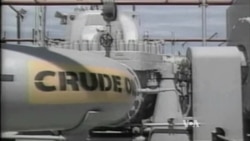Proposed legislation to end a decades-long ban on exporting most U.S.-produced crude oil is sparking sharp debate in Washington and the energy industry.
One oil company chief says the outdated rules hurt his company and keep the U.S. economy vulnerable to foreign oil producers. But ban supporters say ending it would boost consumer energy prices and hurt the environment. One bill to end the ban has been introduced in the House, another is expected in the Senate.
U.S. drivers waited in long, frustrating lines in 1973 when Arab oil exporters cut supplies to the United States.
Worries about access to oil and soaring prices then prompted a new law blocking the export of U.S.-produced crude oil.
The ban had little effect when the United States was importing more and more crude to make up for falling U.S. oil production.
But new techniques in recent years, called “fracking," boosted domestic production and cut U.S. demand for imported oil.
That falling demand pushed down global prices and, ironically, hurt U.S. frackers.
Oil producers say lifting the export ban, which they call "outdated" would help their companies.
Chris Faulker, who leads Breitling Oil, said, “Things have changed, we are not in the idea of fear and scarcity; exuberance and abundance describes the United States of America today. But this law is continuing to hold us back and drag us into the 1970s."
But ending the ban would hurt consumers, said Tyson Slocum, who runs the energy program at the Public Citizen advocacy group.
“The likely result would be higher gasoline prices in the U.S. market," said Slocum.
Oil industry experts say exports, however, could cut U.S. gasoline prices.
“Because it is putting more supply, other options into the world markets. Gasoline is marketed across the planet not just in the United States so we could see a price reduction occur," said Faulker.
The industry’s critics also say exporting crude would encourage more drilling which would hurt the environment.
“Allowing uninhibited [U.S.] oil exports is going to vastly increase the rate of fracking and that is going to cause a lot more environmental harm," said Slocum.
However, the oil industry calls environmental concerns exaggerated, and contends that properly-conducted drilling, including fracking, does not cause undue harm.





